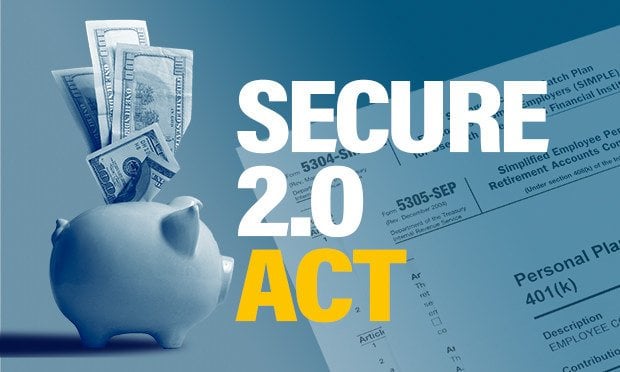
A new survey of small business owners finds that many still don't feel they can afford to offer retirement savings plans as a benefit, despite increased interest after the recent SECURE 2.0 legislation.
The Small Business Retirement Survey Report, released by Capital Group, found a 7% increase in interest in offering a retirement plan among small business owners since the passage or the law, which was designed to make it easier for businesses to offer such plans to their employees.
Recommended For You
The report, which surveyed more than 600 business owners and employers in May and June of this year, found modest increase in interest, but also found that nearly 40% of owners believe their company isn't big or stable enough at the moment to offer a retirement plan. A further finding, that 74% of small business owners saying they are "likely" to implement such a plan in the next two years, may be a reflection of a wait-and-see attitude, but suggests that challenges still exist for these companies.
"Our findings reveal that the passing of the SECURE 2.0 Act in late December 2022 marked a significant stride towards enabling more small business owners and employees to pursue retirement stability, though barriers remain," said Renee Grimm, senior vice president of Retirement Plans at Capital Group. "We're seeing forward momentum, but something is holding small business owners back. Many seem to be on the cusp of offering their employees a plan and may simply need the guidance of a financial advisor to utilize and maximize the benefits available to them."
SECURE 2.0: Awareness of the new law varies
The survey found that although 57% of business owners are familiar with the provisions of the SECURE 2.0 Act, only 9% of employees said they were aware of the law. Small business owners with more than 50 employees were much more familiar with the provisions than those with fewer than 50 employees, the report said.
 Join our LinkedIn group, ALM's Small Business Adviser, a space where small business owners can gather to network, have discussions and keep up with the trends and issues affecting their industries.
Join our LinkedIn group, ALM's Small Business Adviser, a space where small business owners can gather to network, have discussions and keep up with the trends and issues affecting their industries. According to Grimm, there are several important changes that the new law creates for small business owners.
"SECURE 2.0 Act created several provisions that apply to small businesses, including a significant expansion of the startup tax credit for certain plan costs paid by the employer," Grimm said. "Our survey also revealed owners and employees were most interested in the penalty-free withdrawals for certain emergency expenses, the eligibility of lower-income employees to receive a federal matching contribution, and the expanded eligibility for long-term, part-time employees."
What are the barriers?
The survey found several barriers that small business owners point to when it comes to holding off on offering a retirement benefit. These include saying that they believe their company is not big/stable enough to do so (39%), saying that they have limited resources (35%), and that they lack knowledge or are not sure where to start (32%).
Related: The powerful benefits of SECURE 2.0 for small businesses (that many are unaware of)
"Many business owners continue to cite cost and size requirements as reasons for not offering a plan," Grimm said. "We encourage business owners to work with a financial professional or a third-party administrator (TPA) to overcome these barriers, determine the best course of action and choose a retirement plan that meets the needs of both employer and employees alike."
Grimm added that starting a retirement plan may not be as difficult as some may think. "Employers should determine what motivates them, whether it's to help their employees save for the future, retain current employees, or attract top talent in today's competitive market, for example. A financial professional can help them choose a solution that's right for their business and take advantage of the new startup plan tax credits."
© Touchpoint Markets, All Rights Reserved. Request academic re-use from www.copyright.com. All other uses, submit a request to [email protected]. For more inforrmation visit Asset & Logo Licensing.






